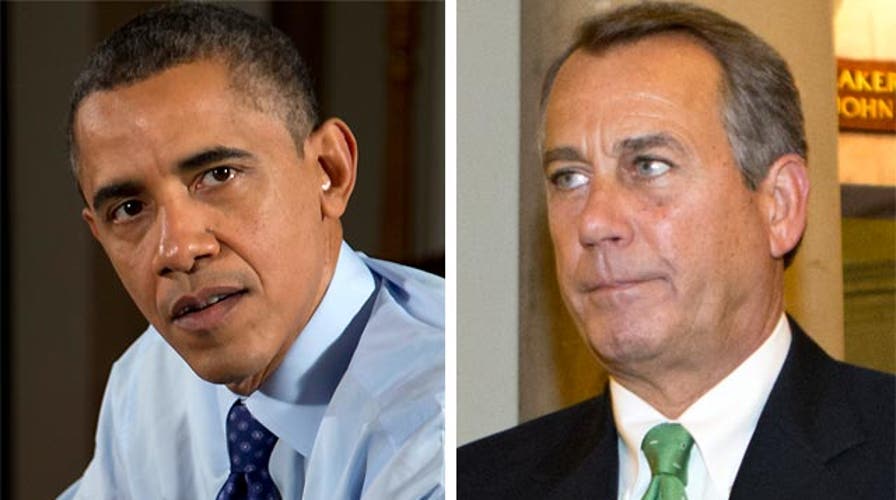GOP wonders if Obama will 'get serious' about spending cuts
Battle over 'fiscal cliff' solution continues
House Speaker John Boehner took to the House floor Tuesday to implore Democrats and the White House to offer something in the way of spending cuts as the nation teeters on the brink of a year-end fiscal crisis.
"We're still waiting for the White House to offer spending cuts," he said.
Within hours, the White House was repeating its mantra that Democrats have already done so.
"The president, unlike any other party to these negotiations, has put forward detailed spending cuts, as well as detailed revenue proposals," White House spokesman Jay Carney told reporters.
But critics say those cuts are more a reflection of creative Washington accounting than of substantive cuts.
- Obama, Boehner talk by phone after exchange of offers on averting fiscal crisis
- Michigan approves right-to-work legislation amid intense protests
- Reid says budget deal by Christmas ‘extremely difficult’
- Forget the fiscal crisis, Obama’s plans threaten our American spirit
- Fox News contributor punched in face at pro-union protests in Michigan
"Over the past several years and as a part of the debt limit negotiations, they pretended to cut spending using the Washington definition, meaning that spending doesn’t rise as fast as it was going to," Dan Mitchell of the Cato Institute said.
The "Washington definition" Mitchell refers to is baseline budgeting, a technique put in place in 1974 as a part of post-Watergate reforms that allows spending increases every year by factoring in inflation and population increases. Under baseline budgeting, legislators frequently use the term "cuts" to describe what is, in reality, a slowing of projected growth.
"The politicians do not want the American people to understand that this is a racket," Mitchell said. "It's sort of like your spouse goes to the mall and says, 'I saved $500 for our family budget.' You think that's great news. Then you find out that your spouse actually spent $1,000 priced down from $1,500. That's exactly what they do in Washington."
Many of the cuts that Democrats have been defending in recent days are contained in the Budget Control Act of 2011, the law crafted in the heat of debt ceiling crisis of 2011. As a part of that deal, negotiators also came up with the so-called "super committee," whose inability to craft a deal led to the automatic spending cuts of the sequester that will gut spending and raise taxes, should a compromise not be worked out by the start of the new year.
But not every analyst buys into the idea that the approximately $1 trillion in cuts included in that law are the result of Washington budget gimmickry.
"The cuts are already embedded in law. They're absolutely imbedded in law and there’s no question about them," Isabel Sawhill, a senior fellow at the Brookings Institution, said.
Bill Beach, the director of Data Analysis at the Heritage Foundation disagrees. "The problem with that is that Congress has done nothing to put legislation in place to cut spending to meet those caps. So that's one of the reasons we're now on the fiscal cliff."
Indeed, since those cuts were spread out over 10 years, the first year being fiscal year 2013, they have not yet happened. Longtime observers of Congress know that promised cuts often have a way of never being realized.
Baseline budgeting is not exclusive to one party, but Democrats have exercised it more often. "There was an attempt when Republicans first got to town in 1994 to clean up this mess," says Mitchell. "But once they were in power for a while, they suddenly decided that the cesspool was really a hot tub. They were using these numbers for their own advantage as well."





